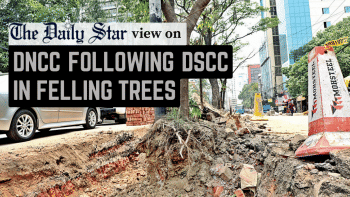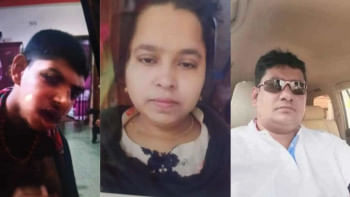Urban farmers' contribution must be recognised to restore Dhaka's wetlands

At the corner of Banani Bridge, Rofikul and Johra run a temporary food stall. Around the stall, they grow vegetables on small patches of land along the Gulshan-Banani (or Korail) lake. The couple, long-term resident of the Korail neighbourhood, has been growing their food for many years. In 2020, the pandemic motivated them to focus more on this venture. They joined a group of urban farmers, Nogor Abad, which finally led to the establishment of the food stall. They grow chemical-free vegetables, fruits and spices, many of which find their way to the stall's tables. They also cook and sell packaged meals with the produce. Their earnings helped Johra reduce her working hours as a domestic worker to lead the couple's independent venture.
When we visited them in December 2024, Rofikul told us about the flowers he planted to draw pollinators. We spotted a common kingfisher perching on a bamboo pole in Johura-Rofiqul's vegetable plot. Rofikul smiled proudly when we complimented him for creating homes for all forms of life along the lakeside.
Johra and Rofikul's greening practices, which received no formal recognition from urban authorities, depict the model of a healthier, fairer, and more liveable Dhaka, not just for people, but for a multispecies urban life. In fact, the couple's greening practices belong to a kaleidoscope of urban farming initiatives all over Dhaka. When done thoughtfully, such farming can benefit both farmers and their local ecologies—a medicine for the polluted urban soil, water, and air. However, urban farming practices, especially poor people's greening practices, are invisible in Dhaka's planning, architecture, and governance. When government authorities plan ecological infrastructure for the city, such as Hatirjheel, they displace poor people and erase their practices of environmental stewardship. An anti-poor, anti-agricultural bias is baked into the technocratic ecological projects common in Bangladesh's urban development and governance.
The city corporation provides rebates to property owners engaged in rooftop greening. But there's no recognition for informal greening initiatives along lakes and canals or in Dhaka's slums where over 30 percent of the population live. This double standard not only exacerbates inequality but also undermines the ecological renewal of Dhaka. The prevalent argument against offering support to informal greening is that slum dwellers do not have tenure rights. But poor urban dwellers often do more to green Dhaka with fewer resources because their food and livelihoods are often dependent on greening. Not recognising their practices is a missed opportunity for creating pragmatic responses to Dhaka's environmental crises.
The limitations of Bangladesh's urban and spatial governance are rooted in profoundly exclusionary patriarchal, racial-capitalist, and colonial models of planning, architecture, and development. Government actors refuse to admit that their planning and development remain at a stubborn distance from the lived experiences of ordinary urban residents. In neighborhoods like Korail, the state's exclusionary perspective has been internalised by political leaders who also use their power to forcefully grab lakeside land to the detriment of the environment and potential livelihoods.
If we are serious about creating a different Bangladesh, we cannot tolerate such exclusionary and violent urbanisation. To build nature-centred fair cities in Bangladesh locally-led agroecological restoration and stewardship are required. Agroecological practices refer to farming in a way that centres around the health and well-being of farmers while also restoring and sustaining local ecologies.
We surveyed 52 farming households in the Korail area in 2019 to learn about their growing practices. The survey found that the farm produce is worth 12 percent of their average monthly household income. For low-income families who have precarious and low-wage jobs, this contribution is significant. It reduces household food expenses and allows mothers to allocate income elsewhere, such as education and health.
More recently, the ReWET initiative has conducted an ecosystem service valuation for the Gulshan-Banani (Korail) lake. Within its broader economic-ecological valuation framework, ReWET's latest study estimated the value of potential farming and fisheries in the lake and lakeside. Investigators found that farming in a restored Gulshan-Banani lake can be worth Tk 12.5 crore annually.
ReWET's economic valuation report on Gulshan-Banani Lake restoration challenges the myth that environmental conservation does not generate as much economic returns as land and housing development. The report claims that the total worth of benefits for a restored Gulshan-Banani lake over 20 years would be Tk 3,00,000 crores. The restoration would bring multiple economic benefits across various sectors, including property value, public health, and climate adaptation.
What we see in Korail is a global south urban innovation that bridges economic development with urban environmental restoration. Urban agroecological practices underway in Korail are an integral part of such a restoration initiative, which ensures that environmental compliance vis-a-vis lakes and wetlands is not merely a matter of beautification, but a core dimension in national and urban economic development.
Agroecological restoration can also advance social inclusion and empowerment of women and youth. In our collaborative research with Korail's farmers, we have been documenting how women have more voice and agency within the household and in the community when they farm and produce food. Women farmers who sell their produce have less financial dependency. Women farmers in the Nogor Abad collective have created networks of mutual support and collective action. Often, farming relationships extend into women supporting each other with other needs such as childcare. They also communicate intergenerational and interregional learning with each other in these networks and among their families and neighbours.
Women farmers in Nogor Abad have reclaimed public spaces around their homes through farming practices. Several women farmers shared that they turned the unsafe places around their homes into gardens. These reclaimed spaces provide community benefits. In Korail, we found that places where men once loitered, did drugs, and smoked have now become green spaces that feed the neighbourhood. Youth involved in farming also report a greater sense of dignity and pride in their neighbourhood.
The state does not require substantial financial investments to support urban wetland restoration. It simply needs to grant urban farmers access to common resources like wetlands and lakes. Such access would lay the foundation for a new claim to the city, where marginalised communities are recognised as urban citizens with rights to their environment.
The ReWET investigation revealed that Korail residents strongly support restoration efforts. A majority of participants (73 percent) expressed support for restoration, and 59 percent indicated a willingness to contribute financially to the Gulshan-Banani (Korail) lake restoration. This finding is counterintuitive, as it comes from urban poor communities. Their willingness to pay for restoration highlights a deep recognition of the importance of urban wetlands and their direct benefits to livelihoods and quality of life.
By enabling such locally-led efforts, the state could open up a new pathway for addressing Dhaka's environmental woes. Once empowered, communities will care for common resources like wetlands, because investing in restoration is, for these communities, an investment in a better future. Nevertheless, coproduction, which emphasises engaging directly with local communities to ensure their voices shape the restoration process, must be at the centre of agroecological restoration efforts. ReWET, for example, is bringing together diverse stakeholders—RAJUK, Dhaka North City Corporation, the District Commissioner's Office, the Department of Environment, and local residents—to create a co-creative model of urban wetland restoration.
However, coproduction is not without its challenges. Government agencies are not used to working closely with slum dwellers as collaborators in restoration projects. Such participatory processes predictably involve informalities that make officials uncomfortable. Communities, too, can be reluctant to engage with government officials as they have to invest substantial resources and energy to reach officials. Turf politics at the local level further complicates efforts, as political leaders and their strongmen often seek rent from restoration projects. These dynamics can leave urban farmers and lake stewards feeling threatened, adding a layer of complexity to achieving truly inclusive and fair urban restoration.
We urgently need to restore Dhaka's urban wetlands, because they are critical ecological infrastructure, particularly given the severe climatic forecasts, the prevalent destruction of ecosystems, accelerating urbanisation, and widening inequalities. Social inclusion and empowerment must be at the front and centre of restoration efforts. Co-production of restored urban wetlands must include local residents, particularly the most ones, by recognising their knowledge, experiences, and the role of urban farmers as environmental stewards.
Efadul Huq is assistant professor of environmental science and policy at Smith College in the US.
Mohammad Azaz is chairman of River and Delta Research Centre (RDRC).
Views expressed in this article are the authors' own.
Follow The Daily Star Opinion on Facebook for the latest opinions, commentaries and analyses by experts and professionals. To contribute your article or letter to The Daily Star Opinion, see our guidelines for submission.


 For all latest news, follow The Daily Star's Google News channel.
For all latest news, follow The Daily Star's Google News channel. 






Comments